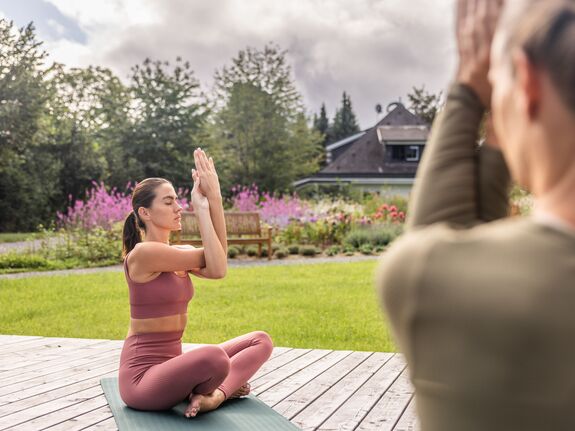Beyond genetics - learning to take control of your own health destiny
While it is true that our genetic make-up and our cirumstances have a major influence on our health, there is a lot we can do as individuals to take our destiny into our own hands. Which role do genetics play in staying healthy? And are there ways we can live a healthy life despite a predisposition for certain illnesses?
In an interview, Dr Katharina Breit and Dr Richard Kogelnig tell us why classic medical approaches are often not sufficient to achieve the desired results, how much of a role genetics really play in our overall health and how health-based self-efficacy can be a highly effective tool to good achieve health over the long term, even in individuals with a poor genetic predispotiion.
Interview
The experts
- Dr Katharina Breit: general practitioner, Mayr doctor, specialising in women's health and psychosomatic medicine
- Dr Richard Kogelnig: Deputy Medical Director at Park Igls Medical Spa Resort, Mayr doctor and general practitioner with a focus on neural therapy, manual medicine and acupuncture
Learning to take control
The path from victim mentality to self-efficacy
Dr Breit: The Covid-19 pandemic showed that a sense of helplessness and powerlessness can lead to a sharp statistical increase in anxiety disorders, depression and mental illness.
Many people live in fear with the attitude that they are at the mercy of a genetic predisposition. Dad has diabetes, grandma died of a heart attack, you yourself have had high blood pressure for a long time – and there is nothing you can do about it. Here at the Park Igls Medical Spa Resort we believe you do not have to be a victim of your genes and your circumstances. Instead, everyone can play an active role in positively influencing their long-term health.
Of course, there are many factors that cannot be influenced, such as serious genetic conditions. However, even when it comes to these, it has been shown that some people manage to deal their genetic condition better than others and thereby achieve a higher quality of life than those who simply give up. The key lies in strengthening health-based self-efficacy!
Genetics and their influence on modern lifestyle diseases
Genetics actually only play a minor role in modern lifestyle diseases (e.g. obesity, type 2 diabetes, tooth decay, cardiovascular diseases). Even if you have a predisposition for diabetes, high blood pressure or high cholesterol, for example, the expression of these genes can be minimised by simply adapting your lifestyle.
What is health-based self-efficacy?
Dr Breit: Self-efficacy can best be described as the conviction that I can perform an action or overcome a challenge through my own efforts. In the same person it can be very strong in one area – for example, in an extreme athlete performing in competition – but very weak in another – for example, when that person has to study for an exam at university. This means there are many different types of self-efficacy, depending on the area in which it is applied.
Health-based self-efficacy can be summarised as follows: I, as a person, can actively maintain and improve my health without direct outside help.
Dr Kogelnig: There are many ways to approach it. Physical training, conscious eating and developing mental strength are definitely part of it. This provides you with several tools that can also be applied in everyday life. In concrete terms, these are short training sessions that can be carried out even in old age, covering everything from conscious chewing to periods of fasting.
Dr Breit: Traditional modern medicine often sees illnesses and genetic predispositions as something you can do little or nothing about. We all know the classic approach - if you have this kind of pain, take this pain killer; if you have this kind of illness, you need this kind of operation. When patients receive a medical diagnosis they are rarely given tips on what they themselves can do to stay healthy or become healthy again.
Dr Kogelnig: In normal GP practices there is hardly enough time to instruct and motivate patients to change their lifestyle. Conventional medicine is therefore primarily about drugs and medication. That makes it very good at reacting but very poor when it comes to foresight and prevention. This is underlined by the fact that in Austria and Europe as a whole just one per cent of the overall healthcare spending goes on prevention.
Dr Breit: Research shows that by strengthening health-based self-efficacy, patients often need fewer drugs or can return to work faster after an illness. It can also lead to a healthier lifestyle and maintain quality of life in the long term. At the same time, it has a holistic effect that also affects mental health. Many people feel powerless when close relatives have certain conditions, for example diabetes. This is where targeted self-efficacy can be useful. We tell patients and their relatives, "No, it's not true, you can do something!"
This programme promotes regeneration, allowing you to experience a new level of wellbeing.
Even after many years of working here I am fascinated by how much patients at Park Igls can do to have a positive effect on their long-term health.
How to achieve and strengthen self-efficacy
Putting it into practice
Self-efficacy is based on a psychological construct developed by the American social psychologist Albert Bandura in the 1970s. It has since been improved and refined into the Four Sources of Self-Efficacy.
- Experiencing success first-hand
- Experiencing success through others
- Feedback & encouragement
- Emotional & physical sensations
Experiencing success first-hand
The most important sources are milestones, however big or small, which show you that your own actions have positive effects. Here at the Park Igls Medical Spa Resort we focus on bringing our guests into an environment where such positive experiences are possible. This makes it possible for people to change their point of view significantly quicker than otherwise.
Experiencing success through others
At the Park Igls Medical Spa Resort our doctors and guests make positive experiences day in, day out by applying the principles of Modern Mayr Medicine. Observing this success provides a source of motivation and creates what is known as model learning - if the person sitting on the table next to me can do it, then so can I!
Emotional & physical sensations
After just two to three days, many guests notice a difference: their skin becomes firmer, their complexion improves and they feel fitter. Many guests literally ‘grow’ during their stay with us at Park Igls – and not just in the figurative sense! In fact, by releasing pressure on the digestive tract and strengthening muscles, guests are up to 3 centimetres taller at the end of their stay than at the beginning of their stay. This phenomenon comes about through a straightening of the intervertebral discs and the spine as a whole.
Dr Breit: Our daily lives are characterised by habits and routines which are difficult to break. At Park Igls, we take patients out of their familiar environment. This change of setting makes it easier for them to also change their behaviour. When patients return to their daily routine, it is things like snacks or high-calorie drinks such as wine or beer that seem most tempting again. That is why health-based self-efficacy is something you need to practise over a long period of time, again and again, in order to break these habits for good.
Dr Kogelnig: We see the best results for long-term changes in patients who come back, because, as we know, repetition is the mother of all learning. Habits are so ingrained because we have repeated them so often. It therefore makes sense to take a week or two each year to repeat and practise the whole process.
Dr Kogelnig: The techniques depend very much on the individual. When it comes to Modern Mayr Medicine, a core element is the chewing process. Meditative chewing – meaning chewing each mouthful at least 20 times – means our guests have the sensation of feeling full after having eaten just half a portion. One tip we give our guests is that it takes around 20 to 30 minutes to start feeling full. That is something you can easily apply in daily life. Another thing we focus on is reduced strength training. This can be very effective for all age groups. If you burn 100 kilo calories of fat per day, that equates to four kilos of weight loss per year. Continuing this weight training over several years can have a major positive effect.
Programmes at the Park Igls Medical Spa Resort
Kick-start your health with Modern Mayr Medicine
You can find more information and interesting facts about Modern Mayr Medicine and its positive effects on your health on our website.





































